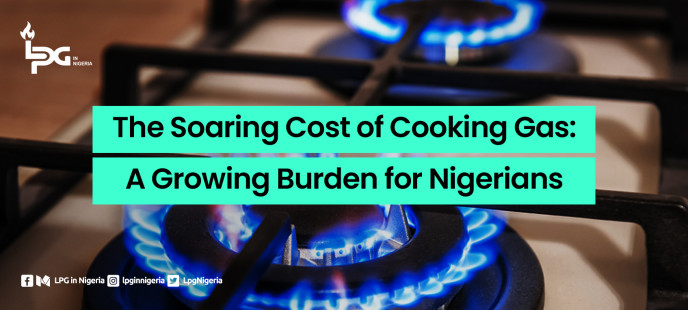- 4486
- 4
Sharing Ideas and Updates on LPG in Nigeria and related information to enable effective collaboration within the LPG Value Chain
The Soaring Cost Of Cooking Gas: A Growing Burden For Nigerians

Cooking gas, a staple for households across Nigeria, has witnessed a staggering price increase of 114% under President Bola Tinubu's administration. From ₦700 per kilogram in June 2023 to ₦1,500/kg in October 2024, the surge has left many Nigerians grappling with the affordability of this essential commodity. Despite being locally produced, Liquefied Petroleum Gas (LPG) is priced in US dollars, and the ongoing devaluation of the naira has compounded the problem.
When Tinubu assumed office on May 29, 2023, the naira traded at less than ₦700 per dollar. Now, the currency fluctuates between ₦1,700 and ₦1,800 per dollar, a reflection of the administration's naira floating policy. This drastic depreciation has significantly impacted cooking gas prices, making it increasingly out of reach for many Nigerian households.
Heavy Reliance on Imported LPG
Although Nigeria is rich in gas reserves, more than 60% of the cooking gas consumed locally is imported, according to Suresh Kumar, Managing Director of the Nigerian Independent Petroleum Company (NIPCO). Speaking at the Nigerian Association of Liquefied Petroleum Gas Marketers (NALPGAM) conference, Kumar stressed that the country’s local production—currently less than 40% of the 1.5 million metric tonnes consumed annually—remains inadequate.
“Companies like Chevron need to convert more propane output into butane, which is more suitable for domestic use,” he urged, emphasizing the importance of government intervention to address this imbalance.
A Regressive Shift: From Clean Cooking to Firewood
The sharp rise in LPG prices has forced many Nigerians to revert to cooking with firewood and charcoal, a trend that undermines efforts to promote clean cooking solutions and curb deforestation. This regression is deeply concerning for both environmental sustainability and public health.
The International Energy Agency (IEA) estimates that 500,000 African women die prematurely every year from exposure to harmful smoke while cooking with firewood, charcoal, or traditional stoves. The report highlights that women and children bear the brunt of this crisis, spending up to **four hours daily collecting firewood**, which limits their educational and professional opportunities.
My Perspective: A Critical Juncture for Policy Action
As someone who writes and researches energy issues in Nigeria, I find this situation deeply troubling. Nigeria is blessed with abundant natural gas reserves, yet systemic inefficiencies and heavy reliance on imports leave us vulnerable to global market fluctuations and currency instability. While the naira’s free fall may seem like an abstract economic issue, its real-world impact on household energy costs is undeniable—and devastating.
The government’s efforts to address local production inadequacies are commendable but far from sufficient. Encouraging companies like Chevron to produce more butane is a start, but we need a broader strategy that prioritizes domestic production, reduces reliance on imports, and ensures that LPG is affordable for the average Nigerian.
If these issues are not addressed, the cost of LPG will continue to soar, forcing more families to abandon clean cooking solutions in favour of firewood. This not only endangers public health but also exacerbates deforestation and carbon emissions, setting back our progress toward environmental sustainability.
A Call to Action
To make LPG accessible and affordable, the Nigerian government must:
1. Stabilize the naira through sound economic policies.
2. Invest in local LPG production to reduce dependence on imports.
3. Provide subsidies or incentives to cushion the impact of rising prices on households.
4. Promote awareness of the long-term benefits of clean cooking solutions.
Addressing these challenges requires a concerted effort, but with the right policies and commitment, Nigeria can overcome this crisis and ensure that clean cooking remains a viable option for all.
4 Comments.
-
-
Herbert
28 November 2024 - 07:24amWell written Jumoke, one point to make is that Chevron cannot concert propane to butane, they can only produce what comes out of the ground.
There is a clear preference for butane in Nigeria because of its higher calorific value, but it does not mean that propane rich LPG cannot so the job. In Europe and US, people use propose for camping gas, there is no danger or risk. Nigerian should be better educated to us what we have, instead of relying on import of butane rich LPG.
Reply -
-
















Shan
28 November 2024 - 09:52amWhat is the composition of cooking gas in Nigeria - typical propane-butane ration in a 12.5kg cylinder?
Reply